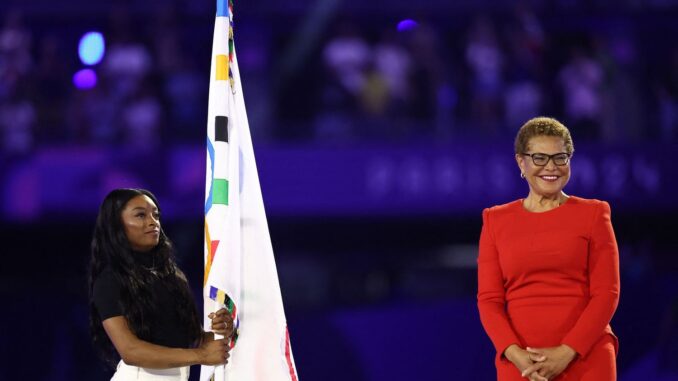
U.S. Olympic gold medalist Simone Biles, who has 1.9 million Twitter/X followers, has seemingly deleted her profile following the intense transgender feud against OutKick’s Riley Gaines, host of “Gaines for Girls.” Twitter/X users started sharing screenshots Sunday of Biles’ account leading to an error message, and this is how word got around that she may have nuked the account entirely.
The beef sparked up after Biles came at Gaines for wanting to keep transgender (biological male) athletes out of female sports. “You should be uplifting the trans community and perhaps finding a way to make sports inclusive OR creating a new avenue where trans feel safe in sports. Maybe a transgender category IN ALL sports!! But instead… You bully them… One thing’s for sure is no one in sports is safe with you around!!!!!” Biles said.
This led to even more personal attacks from Biles, including comparing Gaines to a man. But we all know the story: Biles ended up backtracking on her transgender support and issuing an apology to Gaines, giving the conservative activist the victory in their beef. But it appears that none of Biles’ public relations moves have worked, and that has resulted in her now deleting her Twitter account.
When it comes to the world of sports, few athletes command as much admiration as Simone Biles. She’s a household name, a multiple Olympic gold medalist, and a role model for millions. But even superstars aren’t immune to controversy. Recently, Biles made headlines not for her gymnastic brilliance but for apparently deleting her Twitter account following a heated exchange with former swimmer Riley Gaines over transgender athletes.
This move sparked debates not only in the sports community but across social media, reigniting discussions about free speech, fairness in competition, and the pressures of being a public figure. Let’s dive into the full story.
Who Is Simone Biles?
Simone Biles isn’t just an athlete—she’s a global icon. With seven Olympic medals and countless World Championship titles, she’s considered the greatest gymnast of all time. Her incredible athleticism, resilience, and advocacy for mental health have elevated her beyond the sport.
But with that fame comes scrutiny. And in today’s digital world, one controversial comment can snowball into a media firestorm.
Who Is Riley Gaines?
Riley Gaines, a former NCAA swimmer, has become a prominent voice in the debate over transgender athletes in women’s sports. She has publicly criticized policies that allow transgender women to compete in female categories, arguing that it creates unfair competition.
Her stance has gained both support and criticism, making her one of the more polarizing figures in modern sports discussions.
What Sparked the Twitter Clash?
The tension began when Gaines made comments about transgender participation in sports, emphasizing her belief in protecting fairness for female athletes. Simone Biles, who has often used her platform to advocate for inclusivity, reportedly pushed back.
Their exchange caught fire on social media, drawing in thousands of responses from fans, critics, and fellow athletes. The heated back-and-forth spiraled quickly, and soon after, Biles’ Twitter account appeared to vanish.
Why Did Simone Biles Delete Her Twitter?
Deleting a social media account is no small decision, especially for someone with millions of followers. For Biles, the move might have been about mental health.
She has been open about the toll online negativity can take. By stepping away, she may be prioritizing peace over public debate. After all, when your notifications are a flood of insults, sometimes the healthiest choice is silence.
The Broader Debate: Transgender Athletes in Sports
This isn’t just about Biles and Gaines—it’s about a bigger, ongoing debate. Should transgender women compete in female sports categories? Advocates argue for inclusivity and equal rights, while opponents stress the importance of fairness and biological differences.
It’s one of the most heated topics in sports today, and when two high-profile athletes clash over it, the conversation inevitably explodes online.
Social Media’s Role in the Drama
Twitter, now rebranded as X, thrives on controversy. One sharp tweet can trend worldwide within minutes. For athletes like Biles, this amplifies every word they type.
But the downside? Even the smallest comment can spiral into cyberbullying, harassment, and endless arguments. It’s no wonder she might have decided enough was enough.
Simone Biles and Mental Health Advocacy
Let’s not forget—Biles has been a strong advocate for mental health, especially after withdrawing from events during the Tokyo 2020 Olympics to prioritize her well-being.
Her decision to delete Twitter isn’t out of character. It aligns with the message she’s been promoting: your mental health matters more than pleasing strangers online.
The Public Reaction
Unsurprisingly, reactions to Biles’ Twitter disappearance were split.
-
Supporters praised her for stepping away and protecting her peace.
-
Critics accused her of avoiding debate and silencing opposing viewpoints.
This divide mirrors the larger cultural clash surrounding the transgender sports conversation.
Media Coverage and Headlines
Major outlets quickly picked up the story. Headlines highlighted Biles’ departure as another sign of how toxic social media can become for public figures. Some framed it as a retreat from the transgender debate, while others emphasized her long-standing commitment to mental health.
How Athletes Handle Online Backlash
Biles isn’t alone. From LeBron James to Serena Williams, many athletes have faced overwhelming criticism online. Some clap back, others ignore it, and some—like Biles—walk away entirely.
This raises a question: Should athletes engage in every controversy, or do they have a right to step back when discussions turn toxic?
The Power of Celebrity Voices in Social Issues
Athletes today aren’t just competitors—they’re influencers. When someone like Biles speaks, the world listens. That’s why her involvement in this debate carried so much weight.
But with great influence comes responsibility, and navigating sensitive topics like transgender rights isn’t easy.

What This Means for the Future of Sports
The clash between Biles and Gaines reflects a larger challenge for sports: balancing inclusivity with fairness. Governing bodies like the NCAA, IOC, and various federations continue to grapple with rules that satisfy both sides.
As debates intensify, the role of athletes in shaping these discussions will only grow.
Why This Story Went Viral
There’s a reason this story blew up. It combines celebrity drama, a hot-button issue, and social media chaos—a perfect recipe for virality. Add in Simone Biles’ global fame, and it’s no surprise people can’t stop talking about it.
Lessons from Simone Biles’ Decision
If there’s one takeaway, it’s this: even the strongest among us need boundaries. Biles choosing to delete her Twitter shows that stepping back isn’t weakness—it’s strength.
In a world obsessed with online validation, protecting your mental space is revolutionary.
Conclusion
Simone Biles’ apparent deletion of her Twitter account after a transgender-related clash with Riley Gaines is more than just another celebrity drama. It highlights the growing pressures on athletes, the toxic nature of social media, and the complexities of modern sports debates. Whether you agree with her or not, Biles’ decision sends a powerful message: sometimes, the healthiest move is to log off.